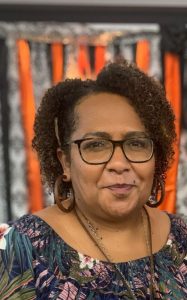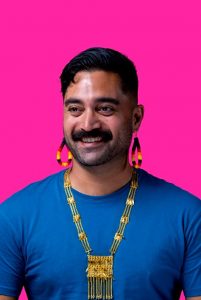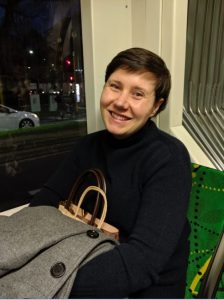Winner of the 2020 Tracey Banivanua Mar PhD Prize, and two highly commended awardees, announced.
Winner of the 2020 Tracey Banivanua Mar PhD Prize, and two highly commended awardees, announced.
AAPS is thrilled to announce the winner of the inaugural Tracey Banivanua Mar PhD Prize. Named after the late Pacific historian, and colleague and friend to many within the AAPS community, the prize recognises the most outstanding PhD thesis by an AAPS student member working in the field of Pacific Studies. This year, out of a very strong field of nominations, the judges awarded the prize to Darumbal and South Sea Islander woman, Dr Melinda Mann, and her thesis “Speaking up and speaking back to high school and post-school transition experiences: An Indigenised narratology exploring education for the life success of young Aboriginal and Torres Strait Islander people living on Darumbal Country”.
The judges had this to say about Dr Mann’s winning thesis:
Dr Melinda Mann’s thesis represents a powerful model of Indigenous research, written by an Indigenous Darumbal and South Sea Islander woman, and grounded in collaborative and ethical engagement with the communities of which she is a part. Utilising an ‘Indigenist framework’, the thesis investigates the experiences of Indigenous youth on Darumbal Country, Queensland, who are students of secondary and tertiary educational institutions. Drawing on a strengths-based approach and mobilising concepts of Belonging and Becoming, Dr Mann sought to understand what is happening to, for and amongst Aboriginal and Torres Strait Islander students, including in their transitions out of formal schooling into further study and employment, and in the roles they assume within their families and community as young Aboriginal and Torres Strait Islander professionals.
The community that Dr Mann researched, and of which she is herself a part, consists of overlapping Aboriginal, Torres Strait Islander and South Sea Islander communities. Each of these communities depends on Elders and leaders to foster shared understandings and history, and Dr Mann’s research is grounded in rich and culturally-informed relations with these Elder, histories, and knowledges. As one of her examiners stated: “The thesis illustrates how community is built upon shared understandings and history, and in turn, the resilience of this community. It shows the humour, sadness, pride and sense of belonging held among the emerging leaders that bodes well for strong leadership in the future”
The AAPS PhD Prize judging committee felt that the methodology, original research and worldview of this thesis captures the essence of Tracey Banivanua Mar’s scholarship and passion for Black histories and life stories. Significantly, it lays out ethical and political engagement for the kind of Pacific Studies AAPS strives for that is engaged with and inclusive of the Indigenous peoples of Australia.
The Tracey Banivanua Mar PhD Prize comes with an award of $1000, and the opportunity to be considered for publication in the AAPS Book Series with ANU Press. We’re excited to work with Dr Mann to develop her thesis for publication. Congratulations Melinda!
More about Dr Melinda Mann:
Dr Melinda Mann is a Darumbal and South Sea Islander woman, who has forged a career advocating for equitable and accessible education. Melinda lives in Rockhampton, Queensland where most of her family and extend family live and where she raises her three teenaged children. Melinda draws on her professional experience in community education and training and development; her lived experiences as an Aboriginal and South Sea Islander woman and her upbringing in small regional and rural towns. In her roles at CQUniversity – including her current role as the Deputy Director of Student Life and Wellbeing, Melinda works to ensure education is accessible for Aboriginal and Torres Strait Islander students, international students, regional, rural and remote students, students living with a disability, students from financially disadvantaged backgrounds and students who are first-in-family to attend University.
In 2019, Melinda became the first Darumbal person to complete a Doctor of Philosophy (PhD) at CQUniversity. Melinda’s research focussed on the experience of young people living on Darumbal Country who were either Traditional Owners or members of other Aboriginal and Torres Strait Islander groups who have relocated to the area. Her research investigated their transition from Year 12 into work or further study, and family and community roles.
HIGHLY COMMENDED AWARDEES
In reflection of the exceptional quality of nominations for the 2020 PhD Prize, the judges also awarded two highly commended awards to Dr Léuli Eshraghi and Dr Lucy Davies.
Dr Léuli Eshraghi, “Taeao: ʻO māfaufauga o faʻāliga ata ma o sāuniga mo o tātou lumanaʻi”
This thesis explores Indigenous curatorial practice and criticism that surpasses faigamālō faʻakolone (colonial processes and impacts). It is a timely and creative exploration of the ethics of representation in post-colonial contexts, including Indigenous curatorial practices, exhibition histories and sovereign futures. Through his notion of ‘ceremonial-political structures’, Dr Léuli Eshraghi covers wide ranging themes of indigeneity, diaspora, decolonization, futurity, and agency, in Australia and abroad. The judges were impressed, particularly, with the ways in which Dr Eshraghi sought to enact, not just describe, a decolonial and trans-Indigenous relational practice through his research, including through a powerful centering of Indigenous languages and epistemologies. This thesis is to be highly commended for placing Pacific Studies in conversation with First Nations scholarship and contemporary art practice in an incisive and cutting-edge manner.
More about Dr Léuli Eshraghi:
Dr Léuli Eshrāghi is a Sāmoan artist, curator and researcher, who intervenes in display territories to centre Indigenous presence and power, sensual and spoken languages, and ceremonial-political practices. Through performance, moving image, writing and installation, ia engages with Indigenous possibility as haunted by ongoing militourist and missionary violences that erase faʻafafine-faʻatama from kinship structures. Ia contributes to growing international critical practice across the Great Ocean and North America through residencies, exhibitions, publications, teaching and rights advocacy. Eshrāghi is the inaugural Horizon/Indigenous Futures postdoctoral fellow at Concordia University, co-guest editor with Kimberley Moulton of Artlink Indigenous art issue titled KIN CONSTELLATIONS languages waters futures (June 2020), and a member of The Space Between Us SSHRC project (2020-28) led by Dr Julie Nagam.
Dr Lucy Davies, “Indigenous mobility and colonial boundaries of rule: how Papuans and New Guineans shaped Australia’s administration of Papua and New Guinea”
This rich historical study analyses the presence of Papuan and New Guinean workers and visitors in Australia throughout the period of Australian colonial administration of the two territories. Through her thesis, Dr Davies highlighted Indigenous practices of mobility, and the elaboration and negotiation of complex Indigenous and colonial networks. The judges were particularly drawn to her close and detailed archival research, including her uncovering of neglected personal correspondence and official records pertaining to the movements of Papuan and New Guinean people. These records documented their experiences of labour exploitation and racial discrimination, but also reveal their attempts at positive relationship-building within Australia. This thesis makes a valuable contribution, particularly, in its nuanced illustration of the relationships between Papuan and New Guinean people and the Australian employers, mentors, abusers and friends with whom they forged connections.
More about Dr Lucy Davies:
Dr Lucy Davies received the Nancy Millis Award for a PhD of exceptional merit in 2019. Her thesis examined how Papuans’ and New Guineans’ travels shaped Australia’s administration of Papua and New Guinea from the beginning of the twentieth century to Independence. In 2012, she was a National Archives of Australia / Australian Historical Association postgraduate scholar and in 2014 she was a National Library of Australia summer scholar. A version of her honours thesis was recently published in Labour Lines and Colonial Power: Indigenous and Pacific Islander Labour Mobility in Australia (ANU Press, 2019 edited by Victoria Stead and Jon Altman). Davies currently works in community heritage.
Both our Highly Commended awardees will also work towards developing their theses for publication in the AAPS Book Series. Both have been awarded a cash prize of $250.
Congratulations to all our awardees!



